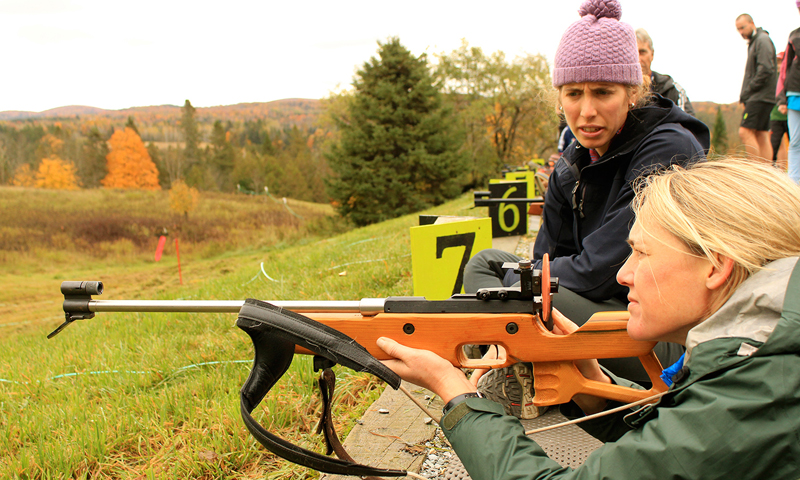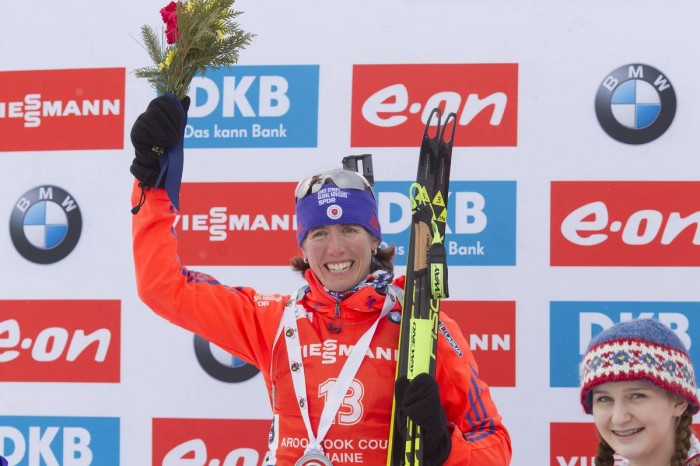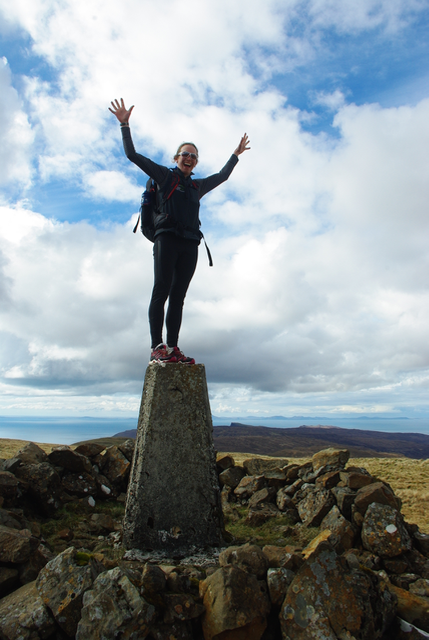
Back in 2010, Susan Dunklee made a big decision for an up-and-coming biathlete. While the US Biathlon Association provided housing the Olympic Training Center in Lake Placid, N.Y., Dunklee wanted a home base which felt more like home.
So she joined the Craftsbury Green Racing Project, near her childhood home in Vermont, living in a renovated farmhouse with other team members and training for shooting on a range in the backyard. Ever since, Dunklee has split her time between the two training sites.
“I’m psyched to move back to Vermont’s Northeast Kingdom, where I’ll continue to train as a biathlete,” she wrote on her blog at the time. “I’m still on the National Biathlon Team (and will travel to several National Team training camps), but as a GRP athlete, I’ll lead a more balanced lifestyle that allows me to contribute to the local community… The lifestyle of a professional athlete can be quite bland outside of training and this is something I have struggled with the last couple years.”

A year and a half after joining the Craftsbury team, she started her first World Cup. Later that season she raced her first World Championships, finishing fifth in the 15 k individual. She has become an Olympian, set best-ever marks for U.S. women at the Games, and earned two World Cup podiums.
But she always comes back to Vermont, and now she has bought a house in Craftsbury Common.
While some of her teammates were traveling around Europe for a seven-week, four-country training camp, Dunklee was busy putting her roots even more deeply into the Northeast Kingdom.
“It’s great to have something to think about and something else meaningful I’m excited about,” Dunklee, 30, said in an interview from her new house. “I have a place to come home to that leaves me feeling grounded and centered.”
World Cup athletes are on the road for four to five months each winter. To some, having a personal place to come back to is even more important after missing friends and family for nearly half the year.
Even when she was just beginning biathlon after graduating from Dartmouth College, Dunklee saw teammates like Tim Burke and Lowell Bailey ensconce themselves in their communities, including owning houses, while at the same time excelling in international competition. That gave her the confidence that the life of an elite athlete didn’t necessarily have to be one of rootless nomadism.
“They each had homes pretty early on in their careers,” Dunklee said. “Now Lowell has a kid, and is Tim is working on building a new house in Lake Placid. They have become a lot more independent from the team. They do it well — I have always looked up to them and the way they do things.”
So far, the tasks associated with being a homeowner have sometimes tugged Dunklee away from biathlon, but she didn’t generally see that as a bad thing.
“There were a few weeks when there were things that really had to get done with the house that affected the training a little bit, but it’s mostly positive,” she said.

When she’s not tinkering on her house, Dunklee has been training hard this summer with a particular focus on shooting. She has taken the concept of periodization, familiar to endurance athletes for their ski training, and applied it to the range.
“I tried to periodize the shooting training so each week has a very different feel to it,” she explained. “Some weeks focus more on speed, overspeed, going faster than I would in a race. Some are more on mental endurance and how I can stay focused when I’m tired. Some are more recovery-oriented. I’ve made sure to have a clear distinction between the different weeks.”
Dunklee is pleased with her progress so far.
“The last few weeks have been exciting,” she said. “Speed is starting to come together. I also got a new rifle stock that fits me really well.”
So far, Dunklee has had few chances to test her shooting speed in actual race situations. She won both the sprint and mass start at the North American Rollerski Biathlon Cup in Jericho, Vt., in August, shooting 60 and 75 percent, respectively.
Then at a training camp in Germany, she and teammate Clare Egan joined Canadian biathlete Megan Tandy to finish sixth in the relay at German Summer National Championships.
More racing are coming up, even before winter arrives. US Biathlon has trials races in Jericho in mid-October, although Dunklee is already pre-qualified for the World Cup. From there, the team travels to Canmore, Alberta, to train on the infamous Frozen Thunder loop.
And then it’s World Cup time, starting in Östersund, Sweden, in late November.
“I really want to see what happens, especially with the shooting, and seeing if I can continue this streak of shooting fast while racing,” Dunklee said. “I know I can do it in practice, but doing it in a race is a totally different ballgame.”
We asked Dunklee to give our ’17 Questions for 2017′ a go. Here are her responses:
1. Biggest change in your life in the last five or so months since the ski season ended?
Buying a house
2. Biggest change in your training?
More volume early summer with less intensity. Also more periodization in the shooting training.
3. Major areas of improvement you’ve seen so far?
Shooting speed is up from last summer. Body seems to be recovering better.
4. Whom you’ve been working closest with this offseason (coaches or training partners)?
National Team coach Jonne Kahkonen. Training partners — primarily Clare Egan and Maddie Phaneuf, plus the Craftsbury Green Racing Project when I am home.
5. Best trip in the last five months (and why)?

Spring break to Isle of Skye in Scotland — good company, fine whisky, beautiful landscape and baby lambs
6. Favorite cross-training?
Overdistance hike/runs, especially on a high ridge.
7. Favorite non-athletic activity or pastime this summer?
Blueberry picking
8. Song that was your jam this summer?
Not too much of a music person but I’m starting to get into NPR podcasts. The TED Radio Hour is pretty good.
9. All time favorite race moment?
Hearing over the loudspeaker that I was leading a race at Ruhpolding World Championships 2012. It was completely unexpected. Ultimately I placed 5th.
10. First thing you pack in your bag when you leave for Europe?
Passport
11. Venue/event you’re most excited to visit this season?
South Korea [site of the 2018 Olympics]
12. Who will win the men’s and women’s World Cup titles this year?
Martin Fourcade and Laura Dahlmeier
13. Biggest sacrifice you feel you’ve made choosing this career path?
Living a split life. I haven’t spent more than 3.5 weeks consecutively in one place for about 5 years
14. If you could change one thing about your sport, what would it be?
World Cups closer to home. It’d be nice to zip back to Craftsbury for off days now and then.
15. What did you have for breakfast this morning?
Green Racing Project-raised eggs and raspberry jam over a couple pieces of homemade toast
16. In 5 years, I’ll be…
35. Not sure what that entails.
17. In 50 years, I’ll be…
Hiking the Long Trail.
Chelsea Little
Chelsea Little is FasterSkier's Editor-At-Large. A former racer at Ford Sayre, Dartmouth College and the Craftsbury Green Racing Project, she is a PhD candidate in aquatic ecology in the @Altermatt_lab at Eawag, the Swiss Federal Institute of Aquatic Science and Technology in Zurich, Switzerland. You can follow her on twitter @ChelskiLittle.



